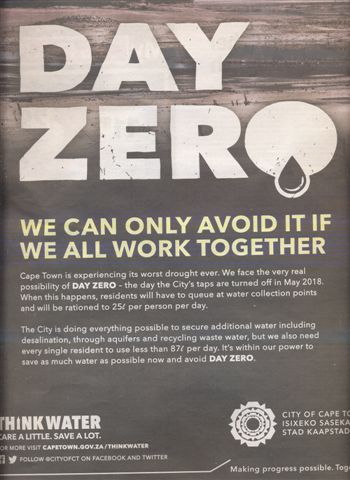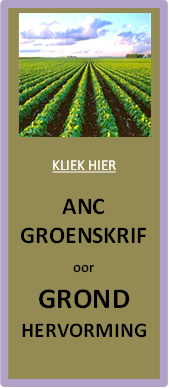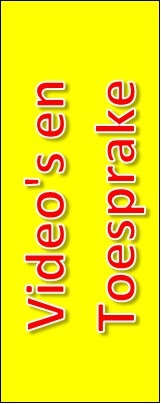Afrikaner
WAT IS ERGER, NAT KORRUPSIE OF DROË KORRUPSIE? DA OF ANC?
 Is daar werklik verskil tussen die DA en die ANC se vindingrykheid om geld uit die vuisvoos belastingbetaler se sak te pers? Die Droogte-/waterskaarste-slenter moet seker die mees waaghalsige geldmaakslenter in die geskiedenis wees. Selfs die vrotmelk-piramiede slenter van Adriaan Nieuwoudt kom nie by hierdie een wat vermetelheid betref nie.
Is daar werklik verskil tussen die DA en die ANC se vindingrykheid om geld uit die vuisvoos belastingbetaler se sak te pers? Die Droogte-/waterskaarste-slenter moet seker die mees waaghalsige geldmaakslenter in die geskiedenis wees. Selfs die vrotmelk-piramiede slenter van Adriaan Nieuwoudt kom nie by hierdie een wat vermetelheid betref nie.
Dié advertensie word nou al weke lank in elke Wes-Kaapse koerant (ook ponie-koerante) volblad geplaas. Dit beloop duisende rande.
Die vuisvoos belastingbetalers moet ook daarvoor opdok, terwyl Coca-Cola (en die ander botteleringsfirma's) al die pad bank toe lag omdat hulle 'n fortuin maak met die bottelering van Kaapse kraanwater in blou bottels.
Teen Tafelberg se hange stort reuse-watervalle tans na benede en vloei weg in stormwaterkanale na die see. Ek het dit Sondag self vanuit Nuweland aanskou. In sentraal Kaapstad is talle ondergrondse riviere met standhoudende water. Miljoene liters water vloei ongehinderd daagliks na die see. Ons het in jare nooit 'n werklike droogte in die Wes-Kaap gehad nie. My reënwatertenk (500 l) was in jare nie leeggetap voordat die reënseisoen elke keer weer begin nie. Ek gee my groentetuin en ander tuinplante daaruit water.
Die Droogte-/waterskaarste-slenter moet seker die mees waaghalsige geldmaakslenter in die geskiedenis wees. Selfs die vrotmelk-piramiede slenter van Adriaan Nieuwoudt kom nie by hierdie een wat vermetelheid betref nie.
En soos dit goedgelowige Ja-stemmers betaam, staan hulle tou by Pick 'n Pay, Shopright, Woolworths en waar ook al om yslike blou bottels H2O ten duurste te koop.
En met die volgende verkiesing stem almal weer vir die DA-alliansie, "want dit sal seker vreeslik gaan as die ANC aan bewind moet kom."
BY EDITOR
Cape Town November 29 2017
CAPETONIANS are being taken for a mega ride again– and this time not by the ANC regime as usual- but by their own Democratic Alliance Councillors in Cape Town itself! There is a huge water-scam in the offing with the city council the only one that will benefit from it. By promoting water scarceness the DA are aiming to make huge profits from gullible Western Cape residents.
The agricultural sector uses 59% of water and households only 12%; yet the DA-led province and City of Cape Town have concentrated most of their efforts to save water, on the households. How efficiencies in water use in agriculture can be improved, have hardly been touched. In fact, a quick check on the bottled water being sold in the 4 main retailers (Woolworths, Shoprite, Spar andPick ‘n Pay) shows that much of the bottled water comes from farming areas within the Western Cape, where ‘the biggest drought in 100 years’ is supposed to be raging. This includes areas likeCitrusdal and Franschoek.
The ANC recently discovered that millions of litres of water have been allowed to leak from the Newlands reservoir, each month, for at least the past 7 years. This type of deliberate neglect raises the question: Have other areas also been allowed to leak and waste water?
Fix the 50 000 leaks
At the end of Winter this year (Sept 2017) the City of Cape Town announced the existence of a list of over 50 000 “ high water “ users. They defined a high water use as being over 20 000 litres per month. Normal household use would be in the region of 10 000 litres. This points to a wastage of at least 10 000 litres for each of the 50 000 households. This points to widespread leaks that the City knows about but refuses to fix on the grounds that these are on private property.
Instead of fixing the leaks the City wants to install water restrictors that can be remotely controlled. Each resident will be charged R4000 for the installation of the restrictor. In other words the City wants to prepare to privatise water so that soon, every resident will have to buy vouchers for pre-paid water (as is currently the case with electricity. )
Hand in hand with this will come massive increases in water tariffs that the City will use its control over the water, to enforce and blackmail the masses into submission. By fixing the leaks, there would be an immediate water saving. The cost of fixing the leaks could be shared on a social basis, which could come in as far less than R4000 for the water restrictor installation. As it is, at least 500 million litres of water is being wasted each month through the leaks that the City has identified but refuses to fix. Over 1 year this is equivalent to 12 days of water for the City of Cape Town.
Graphene technology- Limpopo
The University of Pretoria ran a project in Limpopo, on high ground. Through only 27m of graphene mesh about 1500 litres of water is collected in rural Limpopo province at Tshanowa primary school. The only task is to keep the gutters clean and to check the wire clips that keeps it in place. It does not use electricity and extracts water from the air. This could easily be installed in and around dams to limit the water loss through evaporation and in areas where the humidity is naturally high, such as Newlands and on certain areas on Table mountain or at housing close to the sea.
Unblock all the canals that feed the dams
In 2016 the DA government knew that the canals feeding the Voelvlei dam were blocked. They did nothing to fix it. Instead they played a blame game with the ANC. By their estimates at least 7,5 Billion litres were lost. This is equivalent to 3 weeks water for the City. An audit needs to be done on all the canals that feed all the dams, to verify exactly what the losses are and to clear all of them.
Rehabilitate the 36 Camissa springs around Table mountain and open them to the public
It is well documented that there are 36 springs and even underground streams of fresh mountain water that wastes millions of litres of water every day. The water just flows into the sea. The Cityrefuses to rehabilitate all of these claiming that the cost of purification is “too high.” The argument is negated by the use of the Newlands spring, which is also untreated, by the public. Further, the City is spending mega millions on rehabilitating sewage but refuses to use the abundant spring water. The Camissa springs should immediately be rehabilitated and made available for public use. But what is happening to the spring water?
Spring water and tap water is being handed over for free to the major retailers for profiteering
A quick survey of the major retailers yields 2 surprises. The first is that most of the bottled water is being sourced from the Western Cape, where there is officially a drought. Spring water is handed over for free to private companies to profiteer from, directly from drought-stricken areas. This water should have been directly pumped into the public water system.
Secondly some of the bottled water is directly sourced from tap water, ie from public water resources, in the middle of a drought, and sold for a profit. This is an outrage and should immediately be stopped. The companies that openly acknowledge the use of tap water are Bonaqua (Coca Cola) and Justwater (from George). The sources of all the bottled water should be audited and all water sources currently used in the Western Cape, should be stopped and redirected into the public water system. This will also have the added spin-off of reducing the amount of plastic that is polluting the planet.
| Pick ‘n Pay | Just water | Tap water |
| Tsisikamma | Humansdorp (W-cape) | |
| Evian | French Alps | |
| Aquelle | Franschoek (W-cape) |
| Checkers | Eastern Highlands | Citrusdal (W-Cape) |
| Aquartz-Clover | Doornkloof East (Gauteng) | |
| Nestle | Doornkloof East (Gauteng) | |
| Aquelle | Kranskop (Kzn) | |
| Valpre | Heidelberg (W-Cape) | |
| Bonaqua | Tap water | |
| Ceres | Ceres (W-Cape) |
| Woolworths | Woolworths | Franchoek (W-Cape) |
| Woolworths | Ceres (w-Cape) | |
| Woolworths | Normandien (KZN) | |
| Woolworths | Citrusdal (W-Cape) |
| OK/Shoprite | Bonaqua | Tap water |
| Aquelle | Kzn | |
| Valpre | Heidelberg (W-Cape) | |
| Nestle | Doornkloof East (Gauteng) |
| Spar | Spar brand | Franschoek (W-Cape) |
| Henties | Witzenberg (W-Cape) | |
| Spar | South Paarl (W-Cape) | |
| Aquelle | Ekhamanzi (Kzn) | |
| Bonaqua | Tap water | |
| Valpre | Heidelberg (W-Cape) |
We have also identified at least 3 other private water bottlers operating in Franchoek, namely, Chamonix, Richeneau and La Vie De Luc. Rather interestingly, the channels between the Berg River and the Theewaterskloof dam run through the Franschoek mountains. The massive amount of water being drawn from Franschoek needs to be investigated as well as any link between the low levels inTheewaterskloof dam and the water being drawn from Franschoek. The private water extraction should be abolished and the water sourced should be channeled to the public water system.
Concluding remarks
The crisis of capitalism leads the monopolies to search for new fields to plunder and make profits from. Here we see the DA government spearhead the privatization of water for the benefit ofmonopoly capital. The multi-billion expenditure on desalination is unnecessary. The neglect by the city and the privatization of water resources come together to boost the profits of big capital and the further increased exploitation of the masses. Water is life. It is not a commodity. Nationalize all the water resources. Place it under workers’ control. Fix the leaks. Make use of rational technology for the interest of the masses not for the benefit of a tiny handful. On the 8th Feb 2017, a political party wrote THIS letter below in this regard to the City of Cape Town. The letter was not even acknowledged.
” Dear Honourable members of the water saving division and honourable Mayor.
Workers international vanguard party has some suggestions for saving water, which you may wish to consider:
1. You have a database of households. This you should be able to check which of them have reduced their water consumption by the most. Deploy some staff to call them to ask what measures they took. Compile a list of measures that could be generalised, and publish this.
2. Run a competition in all primary and high schools, all colleges and universities. Offer prizes to all of them for the most innovative water saving ideas. E.g., offer R1000 per school and offer R10 000 per university or college. In effect, this would be a broad educational campaign that would help to sensitize every household and should lead to an immediate impact. You could establish a facebook page where anybody could post videos or tips for saving water;
3. Ask every household to check the water meter when all taps are closed. This would uncover if there are leaks. Get a toll free number or free sms line to report such faults and deploy teams to repair these.
4. In Brazil they have electrical connections that heat up water instantly; use of this product could help save water lost through waiting for the hotter water to reach the shower head;
5. Meanwhile, a bucket could be used to catch the colder water that would normally be lost when showering; this water can be used for gardening or for flushing; when showering, the taps could be turned off when lathering the facecloth and applying the soap lather to the body; the taps could then only be turned on in spurts to complete the lathering; the taps are then re-opened when washing the lather off completely;
6. In the educational campaign the promotion of saving water even in winter is important; this would help to boost reserves for the next dry season;
7. Between the hours of 10pm and 4am, the water pressure could be set lower so that the losses from leaking taps and pipes would be minimised;
8. There are underground rivers flowing under the CBD; this water could be diverted into the water system for recycling;
9. When opening taps, we should consciously reduce the water flow;
10. Use leftover water from a kettle, to wash some dishes;
11. There is a huge Coke bottling premises next to Manenberg; they use a lot of water; they should be asked to import their product from other parts of the country for a month;
12. Every business that is a high water user should be compelled to present and enforce a water saving plan.
Hoping that these would be considered”
EDITOR’s FOOTNOTE:










